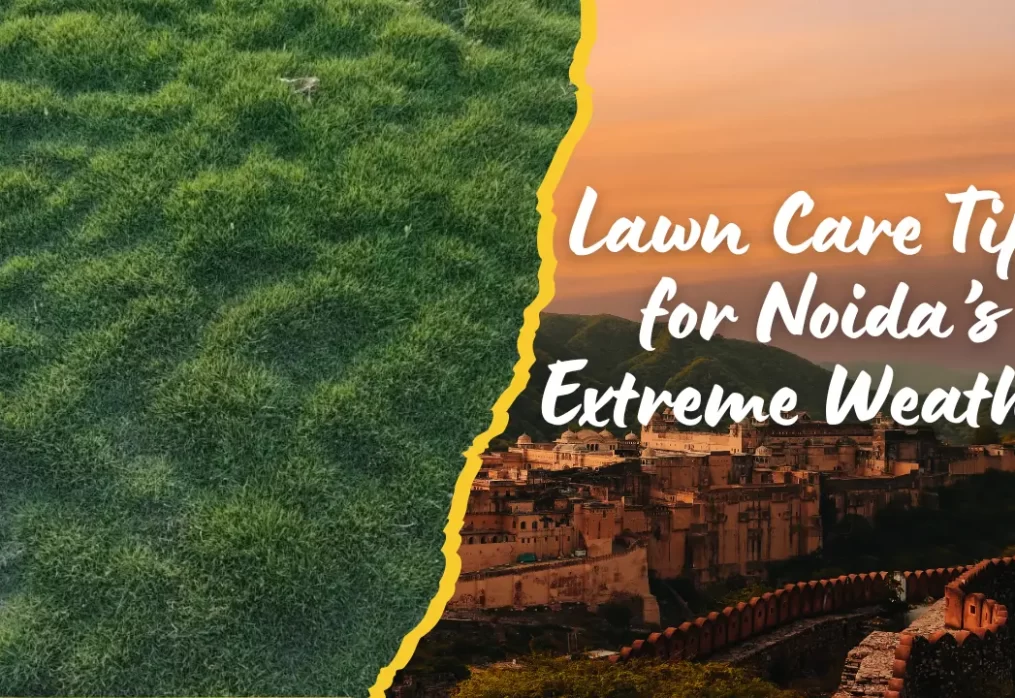Lawn Care Tips for Noida’s Extreme Weather
Introduction
Maintaining a lush green lawn in Noida’s extreme weather is no easy task. With scorching summers, unpredictable monsoons, and chilly winters, homeowners often struggle to keep their lawns healthy year-round. But with the right techniques and seasonal care, your Natural Lawn Grass in Noida can stay green, fresh, and welcoming no matter the weather.
Understanding Noida’s Climate
Noida experiences three dominant weather conditions that directly impact lawn health:
Hot Summers: Temperatures often soar above 40°C, leading to dry and stressed grass.
Monsoon Season: Heavy rainfall causes waterlogging and fungal growth.
Cold Winters: Frost and chilly winds slow down grass growth.
Knowing these patterns helps you plan your lawn care more effectively.
Choosing the Right Lawn Grass for Noida
The first step towards a healthy lawn is choosing the right type of grass:
Heat-Tolerant Grasses: Bermuda grass and Zoysia thrive in hot summers.
Shade-Friendly Options: Carpet grass is perfect for partially shaded lawns.
Low-Maintenance Choices: Buffalo grass requires less water and care.
Selecting grass that adapts to extreme weather ensures year-round greenery.If you want detailed guidance for specific spaces like villas, farmhouses, or modern homes, check our guide on Best Lawn Grass for Noida Homes, Villas & Farmhouses.
Soil Preparation and Lawn Foundation
Healthy grass begins with healthy soil. Conduct a soil test to understand nutrient levels. Add organic compost or cow dung manure to enrich the soil. Ensure proper leveling so rainwater drains well, preventing puddles that damage roots.
Watering Tips for Extreme Weather
Summers: Water early in the morning or late evening to prevent evaporation.
Monsoon: Avoid watering unless necessary to prevent fungal issues.
Winters: Water less frequently, preferably mid-morning, to avoid frost damage.
Always use deep watering to encourage strong root growth.
Fertilization Schedule
Your lawn needs a balanced diet too!
Spring & Summer: Apply nitrogen-rich fertilizer for lush green growth.
Monsoon: Reduce fertilization to avoid excessive growth and fungal issues.
Winter: Use potassium-based fertilizer to strengthen grass before frost.
Prefer organic fertilizers for long-term soil health.
Mowing Guidelines
Proper mowing keeps your lawn healthy:
Maintain 2-3 inches height during summers to protect roots from heat.
Avoid mowing wet grass during monsoon to prevent fungal spread.
Mow less frequently in winter since grass growth slows down.
Never cut more than one-third of the grass blade at once.
Weed Control in Harsh Weather
Weeds compete with your grass for nutrients. Common Noida lawn weeds include crabgrass and dandelions. Use mulching to suppress weeds naturally, or apply organic herbicides for stubborn growth.
Dealing with Pests and Lawn Diseases
Common pests like caterpillars, ants, and termites can damage your lawn. During monsoon, watch out for fungal diseases like brown patch and leaf spot. Use neem oil sprays or eco-friendly pest control methods to keep them at bay.
Lawn Aeration and Drainage
Compacted soil prevents air, water, and nutrients from reaching the roots. Aerate your lawn at least once a year. For small lawns, a garden fork works well. During monsoon, ensure good drainage channels to prevent waterlogging.
Protecting Your Lawn in Summers
Apply mulch to retain soil moisture.
Avoid over-fertilizing as it stresses grass in heat.
Provide temporary shade for sensitive patches if possible.
These little hacks can save your lawn from heat stress.
Monsoon Lawn Care
Heavy rains can suffocate roots. To protect your lawn:
Improve drainage to prevent puddles.
Apply fungicide or neem-based solutions to stop fungal growth.
Avoid walking on wet grass to reduce soil compaction.
Winter Lawn Care Tips
Winters in Noida can be surprisingly cold. Protect your grass by:
Watering once a week in mid-mornings.
Covering sensitive grass with mulch or garden fleece during frost.
Reducing mowing frequency and letting grass grow slightly taller.
This helps the lawn recover quickly in spring.
Eco-Friendly Lawn Care Practices
Sustainability is key!
Use rainwater harvesting to irrigate your lawn.
Prepare compost tea to naturally boost soil health.
Avoid chemical-heavy treatments; instead, go organic whenever possible.
Conclusion
Caring for a lawn in Noida’s extreme weather may seem challenging, but with the right techniques, it becomes manageable. Choosing suitable grass, preparing soil, adjusting watering schedules, and protecting against pests are key to maintaining a lush green lawn throughout the year. With a mix of smart practices and eco-friendly methods, your lawn can be the envy of the neighborhood.
FAQs
1. What is the best grass for Noida weather?
Bermuda, Zoysia, and Buffalo grass are excellent choices due to their heat tolerance and resilience.
2. How often should I water my lawn in summers?
Water deeply 2–3 times a week, preferably early morning or late evening.
3. Can I grow grass in shaded areas in Noida?
Yes, Carpet grass is a great option for partially shaded lawns.
4. How do I prevent lawn fungus during monsoon?
Ensure good drainage, avoid overwatering, and use neem oil or fungicide when needed.
5. Is natural grass better than artificial turf in Noida?
Yes, natural grass improves air quality, reduces heat, and looks more refreshing than artificial turf.
Last Updated on 4 weeks ago by Anjali Mehra Ph.D. in Horticulture (Punjab Agricultural University)
- Best Lawn Grass for Cold Climate in Kashmir - March 1, 2026
- Lawn Grass Lifespan in India – Which Grass Lasts Longest? - February 23, 2026
- Can Lawn Grass Grow Without Direct Sunlight? (2026 Expert Guide) - February 12, 2026
